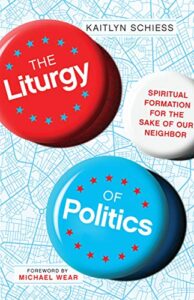 Summary: To have our faith impact our politics and not the other way around, we have to be intentional about our spiritual formation concerning our politics.
Summary: To have our faith impact our politics and not the other way around, we have to be intentional about our spiritual formation concerning our politics.
My favorite definition of spiritual formation is from M. Robert Mulholland Jr., “Spiritual formation is a process of being formed in the image of Christ for the sake of others.” Kaitlyn Scheiss’ subtitle orients this book to think about spiritual formation in politics similarly. One of the most common complaints about “Evangelical” is that it has become a political descriptor instead of a theological one. Scheiss is also concerned about how Evangelical as a term has become oriented around politics, but her approach in this book is contrary to some who are also concerned about the overtaking of the church with politics. She believes that our problem is not overthinking about politics in the church but too little about politics.
Cornel West’s well-known quote, “Never forget that justice is what love looks like in public,” is related to how Scheiss is connecting politics to Christianity,
“In one way or another, almost any political or moral issue is about the honor and protection of human beings. In reality, every piece of legislation is trying to legislate morality. Every policy issue is based on moral principles and has moral implications.”
There is much in The Liturgy of Politics that references other books I have read on spiritual formation. James KA Smith’s work on cultural liturgies is hinted at in the title. Alexander Schmemann’s “For the Life of the World,” a phrase that has also been used widely by Miroslav Volf and others, is a chapter title. NT Wright’s thinking on eschatology is also crucial in Liturgy of Politics in orienting the reader away from inappropriate rejection of the importance of our work in this world. There is much here that I recognized from previous reading. Still, Kaitlyn Scheiss is rooting her work in political thought for the church in theological and spiritual formation thinking, not altering her theology based on her politics.
The two aspects of the book that I most appreciate are its orientation toward thinking about how spiritual practices, which we may do for other reasons, can, when we think of them regarding politics, also help form us to love others well politically. And I appreciate how she has worked through our theological and historical blindspots within evangelicalism that have made us susceptible to the abuse of power and politics.
The Liturgy of Politics is not a book about specific political policy but about how to broadly think about and act on our politics in an appropriately Christian way. She does not assume that everyone will come to a single political position but that we can still trace through our political thinking even as we come to different policy positions with similar theological convictions. This book would make an excellent small group discussion book and will likely be better by discussion because we all have political and theological blindspots. Reading a book like this by ourselves can sometimes allow us to confirm our biases, assuming that Scheiss would naturally agree with our preconceived positions. However, the discussion with others can allow us to see other positions that we may not have readily seen for ourselves.
Kaitlyn Scheiss has been an acquaintance in my online world for a while, so I am not coming to her work without any background. She has been part of the private Facebook community that is associated with Christ and Pop Culture Magazine. And she is a great follow on Twitter. And now she is also a regular on the Holy Post podcast. She started a doctoral program at Duke Divinity School this fall, so I look forward to being impacted by her theological thinking for a long time.
The Liturgy of Politics: Spiritual Formation for the Sake of Our Neighbor by Kaitlyn Schiess Purchase Links: Paperback, Kindle Edition, Audible.com Audiobook